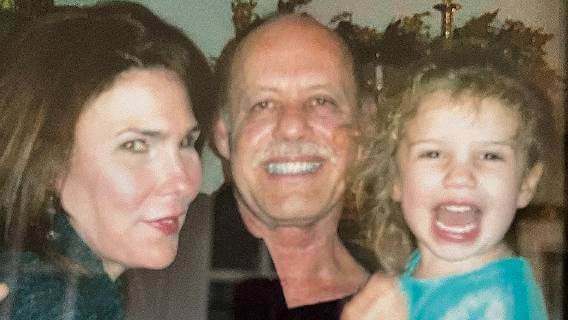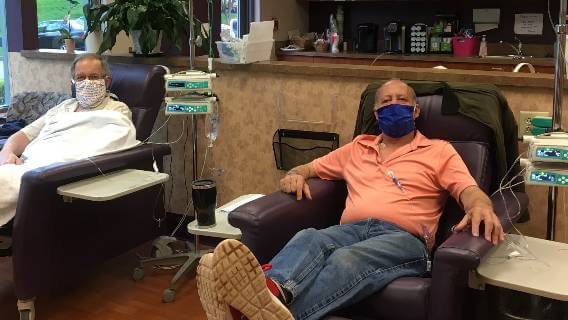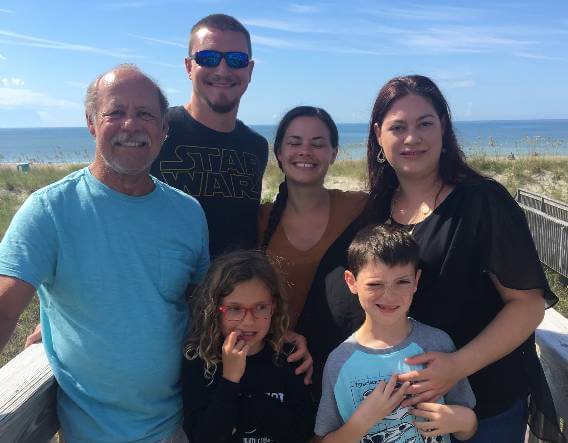5-Year Mesothelioma Survivor Motivated by Family

Fact Checked | Written by: Tim Povtak | Last Update: 10/23/2024 | 6 Min Read
As a mesothelioma survivor, Albert Schwartz has already beaten the odds. He’s lived longer than anyone expected, but he has good reason to want more.
The incentive is there.
Her name is Olivia, the adorable 10-year-daughter of his wife Rebecca, whom he married in 2017, just two weeks after he was diagnosed with pleural mesothelioma.
“She is so precious, probably the biggest inspiration for me staying alive this long,” Schwartz said. “I love her with all my heart. I want to see her go through stages of life. I don’t want to miss her going to prom, her cheer dances at school, her first driving lesson, and everything else as she matures. She calls me Dad. She keeps me going.”
Olivia was 13 months old when her father died. She was only 2 when Schwartz met her mother. The three have been inseparable ever since.
She motivates him daily and provides him with the strength to endure the painful uncertainty he faces. She also brings him unbridled joy.
“I’ve learned how important it is to have great people around you when you are dealing with something like this,” Schwartz said. “I would tell someone just diagnosed that you have to latch on to whatever works for you. It will give you a reason to fight. And mesothelioma is a fight. It is a battle with what you have to go through.”
Mesothelioma Treatment Takes its Toll
Mesothelioma is a rare cancer with no cure. Schwartz, 66, recently passed the five-year mesothelioma survival mark, which only an estimated 10% of pleural mesothelioma patients do.
He first underwent an aggressive pleurectomy and decortication surgery at the University of Maryland Greenebaum Cancer Center. Surgery lasted 10 hours and almost killed him. He went into cardiac arrest twice.
After surgery, Schwartz spent almost two weeks in the intensive care unit, often delirious when taken off the respirator. His eventual recovery surprised even his thoracic surgeon, mesothelioma specialist Dr. Joseph Friedberg.
“It was a nightmarish time for me, hallucinating all the time. I couldn’t breathe when I was conscious. I thought they were trying to kill me,” Schwartz said. “I do remember telling my wife and brother who were there to get me the hell out of the hospital. And it haunted me for a couple years after.”
His surgery was followed by six rounds of chemotherapy, which was tolerable at first, but side effects grew painfully more difficult as treatment progressed. For two years, though, Schwartz was relatively cancer-free. He resumed his life once again, playing golf, fishing and enjoying family.

Brothers Share Chemo Experience
By the end of 2019, scans showed that the mesothelioma tumors had returned and spread aggressively on both of Schwartz’s lungs, leading to four more rounds of chemotherapy. Only this time, he had company at the cancer center.
His brother, Ron Schwartz, had just been diagnosed with non-Hodgkin lymphoma. For three months, they scheduled their chemotherapy infusions together in nearby Gainesville, Virginia.
Although they were always close growing up, just two years apart, they have grown closer than ever before in the last three years, leaning heavily on one another.
“Having your brother share that experience with you is pretty epic,” Schwartz said. “Our side effects were different sometimes, but we shared some, too. Chemotherapy is a weird thing to describe to people who never lived it. At times you just don’t feel right, but it’s hard to always pinpoint why. Your body just gets out of sorts. My brother was the only one who could relate to me and how I was feeling. It took our relationship to another level.”
The two spent considerable time together, including occasional weekends at Ron Schwartz’s second home in the North Carolina riverfront town of New Bern. They talk for hours now, trading stories and reliving memories from decades past. Schwartz’s brother is doing well today, with a long-term positive outlook.
Immunotherapy Targets Tumor Recurrence
After stopping his latest maintenance program early in 2022, new tumor spots reappeared on Schwartz’s left lung. Chemotherapy was no longer working effectively.
He recently started his latest mesothelioma treatment regimen, the immunotherapy combination of Opdivo and Yervoy, which was only recently approved by the U.S. Food and Drug Administration and has worked well for a small percentage of mesothelioma patients. His next scan will be early in 2023.
“I’m excited to see what the immunotherapy does for me,” he said. “With mesothelioma, and a lot of cancers, you start running out of treatment options. I’ve been fortunate to this point. I was eligible for surgery, which most people aren’t. The chemotherapy was effective, which it’s not for a lot of people. And when the cancer returned it was effective again, for a short period. Let’s see how this goes now.”

Family Remains His Driving Force
Despite all the pain he has endured in this fight with mesothelioma, Schwartz points to one incident at his kitchen table as the worst in his journey, an indication of what drives him today.
It was near the end of one chemotherapy regimen with serious side effects. He, Olivia and Rebecca had just finished dinner and his coughing grew stronger and stronger.
As he pushed away from the table, he suddenly vomited across the room, leaving Olivia with a lasting memory that haunts them both today, which bothers him deeply.
“It traumatized my young daughter, who I love so much. Of all the pain I’ve gone through the last five years, what hurts me the most is that now, several years later, if I start coughing loud that memory comes back and she runs for cover, like a slingshot out of the room,” he said. “And that really sticks with me because I always want to be there for her.”
This past summer, Schwartz had the privilege of the first dance with the bride at his older daughter’s wedding, an event he relished attending.
“There are things I can still do, but a lot of things I can’t anymore. Fatigue stops me from doing very much now,” he said. “My mind wants to do things, but my body isn’t able. There is numbness, still pain related to the surgery. My advice to anyone diagnosed is to find a reason like I have to fight and to live, to keep you going.”





